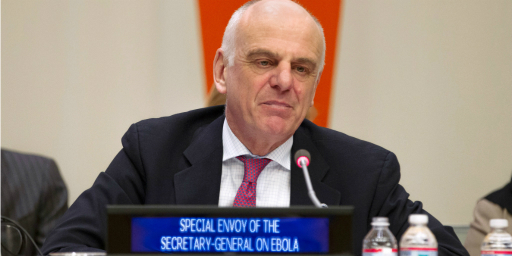In less than two weeks the world will come together to choose a new leader for the international agency responsible for global health issues, from eradicating polio to fighting Ebola.
The World Health Assembly, which represents all the nations of the world, will meet at the end of May to elect a new Director General of the World Health Organization. Every nation has one vote. They will be choosing between three very different candidates. One is an Ethiopian politician, not a medical doctor like the WHO’s previous Director Generals but a former health minister. The second is a Pakistani doctor for whom running the WHO would be her first major international job.
The third is David Nabarro. Nabarro started his career as a doctor, working in remote villages in developing countries such as Nepal and Uganda. He became an internationally recognised expert in development and health, serving as DFID’s most senior health official. Since the late 1990s Nabarro has worked for the United Nations. Over the last twenty years he has been involved in some of the most important health challenges the world faces, from malaria, to nutrition, to Ebola and cholera. He has served as Chief of Staff to legendary WHO DG Brundtland and spent much of his long and distinguished UN career working with the WHO, including leading the post-Ebola emergency reforms. His competence and experience have taken him to the very top of the UN.
Many factors will come into play in the election for the next WHO DG. Some countries are asking whether the leadership of the WHO should rotate from one region to another? And if so, is it now Africa’s turn? Or more generally, which candidate would best represent the developing majority? And should the WHO remain predominately technical or become a more political organisation?
Yet the challenges the WHO is dealing with require the world’s best technical and medical expertise and the world’s best professional management. They also require the world’s best ability to ensure the buy-in of all nations – but without compromising the medical principles and scientific excellence upon which the WHO was founded. Above all they require resources, used well.
So the questions we hope that every one of the World Health Assembly’s 194 national representatives will ask themselves in Geneva on Tuesday 23 May are:
• Which candidate would I trust most to manage the WHO’s $2.2 billion budget effectively, and to convince the world’s major donors to unlock the funding that will be necessary if the WHO is to succeed in the future?
• Which candidate would I trust most to manage the WHO’s complex confederal structure so that it delivers real results, particularly in developing countries where the needs are greatest?
• And finally, which candidate would I trust most to lead the global response when the next health emergency strikes, a risk that probability and science tells us could be imminent and much worse than Ebola?
David Nabarro says that being Director General of the WHO is the job he has been training for his whole life. He’s the only candidate who has worked both as a doctor in some of the world’s most remote regions and as a senior UN official on the world’s greatest public health challenges. And he’s the only candidate who can confidently bring together all the WHO’s constituencies, from the medical professionals, to the WHO’s regional directors, its major donors and partners, and above all the health ministries and systems in the developing world that need the WHO the most.
The WHO needs a proven international leader it can trust to deliver results and to respond effectively in an emergency. David Nabarro is the best qualified person for the job.

